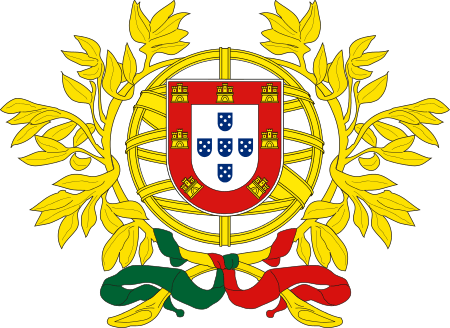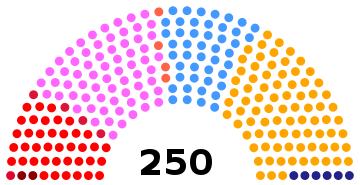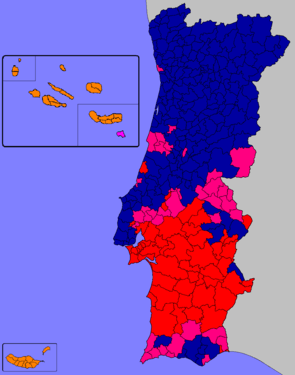1980 Portuguese legislative election
The Portuguese legislative election of 1980 took place on 5 October. In January 1980, the Democratic Alliance, which had won the previous election, on 2 December 1979, entered office with Francisco Sá Carneiro leading the government. However, this election was an extraordinary election, and so, in 1980, another election was held.
| |||||||||||||||||||||||||||||||||||||||||||||||||
250 seats to the Portuguese Assembly 125 seats needed for a majority | |||||||||||||||||||||||||||||||||||||||||||||||||
|---|---|---|---|---|---|---|---|---|---|---|---|---|---|---|---|---|---|---|---|---|---|---|---|---|---|---|---|---|---|---|---|---|---|---|---|---|---|---|---|---|---|---|---|---|---|---|---|---|---|
| Registered | 7,179,023 | ||||||||||||||||||||||||||||||||||||||||||||||||
| Turnout | 6,026,395 (83.9%) | ||||||||||||||||||||||||||||||||||||||||||||||||
| |||||||||||||||||||||||||||||||||||||||||||||||||
 Results by district or autonomous region PSD ran alone in the Azores and Madeira. PS ran alone in the Azores, Madeira, Europe and Rest of the World. | |||||||||||||||||||||||||||||||||||||||||||||||||
| |||||||||||||||||||||||||||||||||||||||||||||||||
| This article is part of the series: |
| Politics and government of Portugal |
|---|
 |
| Portugal |
Electoral system
The Assembly of the Republic has 250 members elected to four-year terms. Governments do not require absolute majority support of the Assembly to hold office, as even if the number of opposers of government is larger than that of the supporters, the number of opposers still needs to be equal or greater than 126 (absolute majority) for both the Government's Programme to be rejected or for a motion of no confidence to be approved.[3]
The number of seats assigned to each district depends on the district magnitude.[4] The use of the d'Hondt method makes for a higher effective threshold than certain other allocation methods such as the Hare quota or Sainte-Laguë method, which are more generous to small parties.[5]
Parties
The major parties involved and the respective leaders:
- United People Alliance (APU), Álvaro Cunhal
- Republican and Socialist Front (FRS), Mário Soares
- Democratic Alliance (AD), Francisco Sá Carneiro
The leader of the Democratic Alliance, Francisco Sá Carneiro, member of the Social Democratic Party was nominated Prime-Minister.
Campaign period
Party slogans
| Party or alliance | Original slogan | English translation | Refs | |
|---|---|---|---|---|
| AD | « Garantir o progresso. » | "Ensure progress." | [6] | |
| FRS | « Um governo para todos. A sua segurança. » | "A government for all. Your safety." | [7] | |
| APU | « Vota APU, para a vitória de Abril » | "Vote APU, for the victory of April" | [8] | |
| UDP | « Abril de novo pela força do povo » | "April again by the strength of the people" | [9] | |
National summary of votes and seats
 | |||||||||||
| Parties | Votes | % | ± | Seats | MPs %/ votes % | ||||||
|---|---|---|---|---|---|---|---|---|---|---|---|
| 1979 | 1980 | ± | % | ± | |||||||
| Democratic Alliance[A] | 2,706,667 | 44.91 | 121 | 126 | 50.40 | 1.12 | |||||
| Social Democratic[B] | 147,644 | 2.45 | 7 | 8 | 3.20 | 1.31 | |||||
| Democratic and Social Centre[B] | 13,765 | 0.23 | 0 | 0 | 0.00 | 0.0 | |||||
| Total Democratic Alliance | 2,868,076 | 47.59 | 128 | 134 | 53.60 | 1.13 | |||||
| Republican and Socialist Front[C] | 1,606,198 | 26.65 | N/A | N/A | 71 | N/A | 28.40 | N/A | 1.07 | ||
| Socialist[D] | 67,081 | 1.11 | N/A | 74 | 3 | N/A | 1.20 | N/A | 1.08 | ||
| Total Republican and Socialist Front | 1,673,279 | 27.76 | 741 | 74 | 29.60 | 1.07 | |||||
| United People Alliance[E] | 1,009,505 | 16.75 | 47 | 41 | 16.40 | 0.98 | |||||
| People's Democratic Union | 83,204 | 1.38 | 1 | 1 | 0.40 | 0.29 | |||||
| Workers Party of Socialist Unity | 83,095 | 1.38 | 0 | 0 | 0.00 | 0.0 | |||||
| Revolutionary Socialist | 60,496 | 1.00 | 0 | 0 | 0.00 | 0.0 | |||||
| Labour | 39,408 | 0.65 | N/A | N/A | 0 | N/A | 0.00 | N/A | 0.0 | ||
| Workers' Communist Party | 35,409 | 0.59 | 0 | 0 | 0.00 | 0.0 | |||||
| PDC / MIRN/PDP / FN | 23,819 | 0.40 | N/A | N/A | 0 | N/A | 0.00 | N/A | 0.0 | ||
| Democratic Party of the Atlantic | 8,529 | 0.14 | N/A | N/A | 0 | N/A | 0.00 | N/A | 0.0 | ||
| OCMLP | 3,913 | 0.06 | 0 | 0 | 0.00 | 0.0 | |||||
| Total valid | 5,888,733 | 97.72 | 250 | 250 | 100.00 | — | |||||
| Blank ballots | 34,552 | 0.57 | |||||||||
| Invalid ballots | 103,140 | 1.71 | |||||||||
| Total (turnout 83.94%) | 6,026,395 | 100.00 | |||||||||
| A Alliance formed by the Social Democratic Party (74 seats), the Democratic and Social Centre (46 seats) and the People's Monarchist Party (6 seats). B Social Democratic Party and Democratic and Social Centre electoral list only in Azores and Madeira. C Alliance formed by the Socialist Party (63 seats), the Leftwing Union for the Socialist Democracy (4 seats) and the Independent Social-Democratic Action (4 seats). D Socialist Party electoral list only in Azores and Madeira. E Portuguese Communist Party (39 MPs) and Portuguese Democratic Movement (2 MPs) ran in coalition.[10] | |||||||||||
| Source: Comissão Nacional de Eleições | |||||||||||
1 Republican and Socialist Front results are compared to the combined totals of the Socialist Party in the 1979 election.
Distribution by constituency
| Constituency | % | S | % | S | % | S | % | S | % | S | % | S | Total S |
|---|---|---|---|---|---|---|---|---|---|---|---|---|---|
| AD | FRS | APU | PSD | PS | UDP | ||||||||
| Azores | 3.1 | - | 57.0 | 4 | 27.3 | 1 | 1.3 | - | 5 | ||||
| Aveiro | 58.8 | 10 | 27.1 | 4 | 6.8 | 1 | 15 | ||||||
| Beja | 22.4 | 1 | 21.1 | 1 | 47.1 | 3 | 1.3 | - | 5 | ||||
| Braga | 54.9 | 9 | 29.3 | 5 | 8.4 | 1 | 0.9 | - | 15 | ||||
| Bragança | 65.3 | 3 | 21.3 | 1 | 4.8 | - | 1.0 | - | 4 | ||||
| Castelo Branco | 51.0 | 4 | 30.3 | 2 | 10.5 | - | 0.7 | - | 6 | ||||
| Coimbra | 46.1 | 6 | 35.9 | 5 | 9.9 | 1 | 0.8 | - | 12 | ||||
| Évora | 29.2 | 1 | 18.7 | 1 | 45.7 | 3 | 0.9 | - | 5 | ||||
| Faro | 37.2 | 4 | 34.7 | 4 | 16.7 | 1 | 1.9 | - | 9 | ||||
| Guarda | 60.6 | 4 | 26.3 | 1 | 5.0 | - | 0.7 | - | 5 | ||||
| Leiria | 59.8 | 7 | 22.7 | 3 | 9.7 | 1 | 1.0 | - | 11 | ||||
| Lisbon | 41.6 | 25 | 28.1 | 17 | 23.1 | 13 | 1.7 | 1 | 56 | ||||
| Madeira | 2.9 | - | 63.6 | 4 | 16.5 | 1 | 4.5 | - | 5 | ||||
| Portalegre | 33.4 | 2 | 32.4 | 1 | 26.1 | 1 | 0.7 | - | 4 | ||||
| Porto | 46.6 | 19 | 34.3 | 14 | 11.9 | 5 | 1.4 | - | 38 | ||||
| Santarém | 42.1 | 6 | 30.4 | 4 | 19.0 | 2 | 1.2 | - | 12 | ||||
| Setúbal | 24.1 | 4 | 23.5 | 4 | 44.0 | 9 | 2.8 | - | 17 | ||||
| Viana do Castelo | 59.2 | 5 | 22.8 | 1 | 10.0 | - | 0.7 | - | 6 | ||||
| Vila Real | 62.1 | 5 | 22.8 | 1 | 5.1 | - | 0.8 | - | 6 | ||||
| Viseu | 66.8 | 8 | 20.9 | 2 | 5.0 | - | 0.6 | - | 10 | ||||
| Europe | 49.6 | 1 | 15.2 | - | 25.4 | 1 | 1.4 | - | 2 | ||||
| Rest of the World | 85.5 | 2 | 2.6 | - | 4.0 | - | 0.4 | - | 2 | ||||
| Total | 44.9 | 126 | 26.7 | 71 | 16.8 | 41 | 2.5 | 8 | 1.1 | 3 | 1.4 | 1 | 250 |
| Source: Comissão Nacional de Eleições | |||||||||||||
Maps
 Most voted political force by municipality.
Most voted political force by municipality.
Notes
- As leader of the Social Democratic Party (PSD).
- As leader of the Socialist Party (PS).
References
- Diário da Républica, 3 de Novembro de 1980 - Lista de candidatos eleitos
- Fundação Mário Soares
- "Constitution of the Portuguese Republic" (PDF). Archived from the original (PDF) on 2016-03-03. Retrieved 2019-12-29.
- "Effective threshold in electoral systems". Trinity College, Dublin. Retrieved 2015-10-21.
- Gallaher, Michael (1992). "Comparing Proportional Representation Electoral Systems: Quotas, Thresholds, Paradoxes and Majorities"
- "Comunicação Política em eleições legislativas em Portugal: uma análise a partir dos cartazes eleitorais (1975-2009)" (PDF). Francisco Teixeira (in Portuguese). Retrieved 12 May 2020.
- "ELEIÇÕES LEGISLATIVAS DE 1980 – FRENTE REPUBLICANA E SOCIALISTA (PS + ASDI + UEDS)". EPHEMERA (in Portuguese). Retrieved 12 May 2020.
- "ELEIÇÕES LEGISLATIVAS DE 1980 – APU". EPHEMERA (in Portuguese). Retrieved 12 May 2020.
- "UDP – 1980". EPHEMERA (in Portuguese). Retrieved 12 May 2020.
- "Electoral results - Assembly of the Republic". Archived from the original on 2012-07-16. Retrieved 2012-09-02.
.jpg)
.jpg)
.jpg)